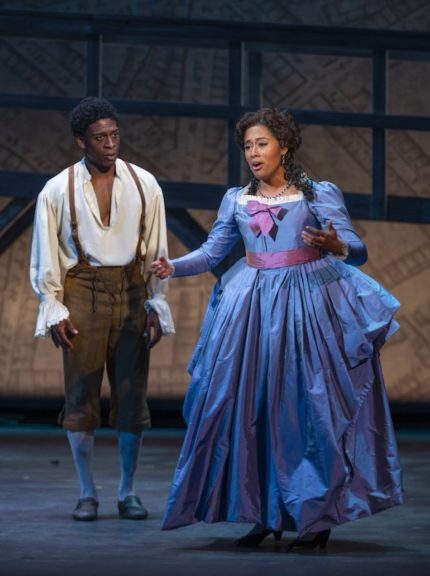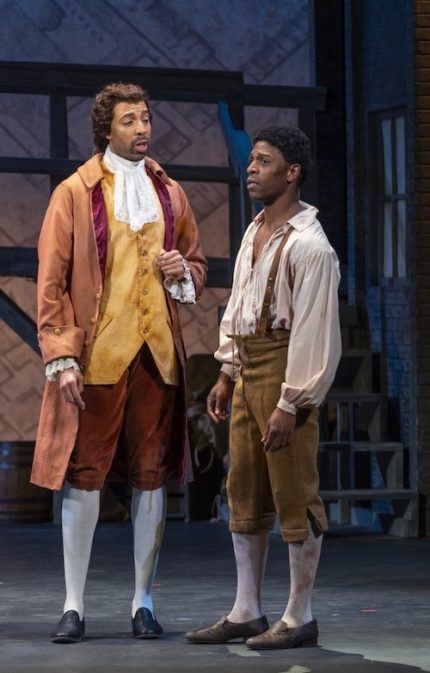COT’s “Quamino” premiere an uplifting tale undone by weak libretto and music

Do new operas get workshopped or developed anymore?
Such were one’s thoughts sitting in the Studebaker Theater Saturday night for the opening performance of Quamino’s Map The new opera by Errollyn Wallen is a Chicago Opera Theater commission, and is being presented in its world premiere through May 1.
Quamino’s Map is “loosely inspired” by S. I. Martin’s novel, Incomparable World. The scenario tells the tale of Juba Freeman, a fiddle-playing American slave who wins his freedom by fighting for the British during the Revolutionary War. He arrives in London after the war as a free man and connects with his friend Quamino, also a former slave, who is working as a cartographer. Juba meets and falls in love with the beautiful Amelia Alumond, a member of London’s black upper class whose family disdains the poor Juba. He steals clothing and a ring to make a strong impression on them at a wedding reception for Amelia’s sister where he proposes to Amelia. His theft is discovered, however, and the disgraced Juba is thrown into prison. He is rescued by the sympathetic sea captain who brought him to England yet Amelia leaves him for another of her class bringing Juba to despair. But his faithful friend Quamino has saved his money to buy Juba a violin and finds him a job as a musician. The opera ends on a hopeful note as a determined Juba vows to work hard and make himself a success.
The story is historically significant, compelling and ultimately heartening. And who doesn’t like a (rare) happy ending in opera?
Unfortunately, Quamino’s Map marks yet another COT misfire, let down by a weak libretto and unmemorable music that fails to rise to the opera’s big dramatic moments.
The general arc of Deborah Brevoort’s libretto makes sense but except for Quamino, nearly all the characters are two-dimensional—or in the case of the Alumond family, plank-like caricatures of the smug, unfeeling wealthy. Juba’s romantic pursuit of the rich Amelia quickly turns into a dull domestic comedy-drama. And, for some inexplicable reason, our hero’s non-progress is interspersed with repeated scenes of the debauched sex vendors of Fleet Street, including a chubby dominatrix who gleefully whips her clients.
Though clearly taking inspiration from Sweeney Todd, such scenes fall completely flat, being more cringe-inducing than funny or sexy. (Wallen has nothing like Sondheim’s light touch to elevate such proceedings.) So too in the scenes of the Alumond mansion, Wallen’s echt-Rococo harpsichord music and silly trilling for the wealthy family is so cartoonish that it becomes impossible to take the characters or the story seriously. Juba’s confrontation with Quamino over his friend’s indentured status being no different than that of a slave provided the only genuine dramatic spark of the evening.
But the main issue is that Wallen’s music overall just isn’t very compelling or interesting. The score is cast in a gray note-spinning style with vocal lines in a ceaseless parlando and big moments merely loud and declamatory. The story cries out for stirring arias with some musical meat that might powerfully reflect Juba’s travails. Ending each scene with a brief determined avowal by Juba and a single high note doesn’t cut it.

Despite the opera’s weaknesses, Quamino’s Map at least provided a showcase for some excellent African-American singers.
As Juba Freeman, Curtis Bannister did all that was expected of him in the opera’s central role, singing with a rather dry-toned tenor yet delivering his top notes with apparent ease. Bannister proved an always energetic if not always subtle actor. (Juba takes off his shirt in one scene and Bannister’s titanium six-pack elicited murmurs from several in the opening-night audience.) One wished that Wallen has given Bannister more substantial music to build a character with, especially in such crucial moments as Juba’s prison scene.
The clear standout in the cast was Damien Geter, making his company debut as Quamino. The towering singer—who is also a composer—owned every scene he was in and elevated the libretto’s mundane dramaturgy almost single-handedly. Geter sang with a rich and imposing bass-baritone, and delivered the most well-rounded characterization as Juba’s loyal friend. Acting and moving with natural ease and dignity, he conveyed the essence of Quamino’s character, a mapmaker and indentured ex-slave who has come to terms with carving out his life in a racist class system his own way.
As Juba’s high-born beloved Amelia, Flora Hawk also made an impressive COT debut, displaying a pleasing light soprano and charming stage presence.
Notable among the large supporting cast was Keanon Kyles as the compassionate Captain Campbell, Cameo Humes as a warm-voiced Reverend Allison, and Tyrone Chambers II, vivid as the half-crazed vagrant Dele Piebald, who functions as a kind of truth-telling “holy fool’ to the proceedings.
The musical and production side was largely well served and gave this premiere as worthy a sendoff as the slight material allowed.
Director Kimille Howard kept the action moving efficiently through several scene changes in the unbroken 90 minutes. Danielle Preston’s period costuming evoked the era effectively as did Steven Kemp’s minimalist scenic design. Not so much Kia Smith’s dismal choreography, which revived unwonted memories of high school halftime ceremonies.
One often wanted a more varied palette of color and dynamics from the orchestra but that is likely the fault of Wallen’s unsubtle scoring rather than Jeri Lynne Johnson’s conducting. In her COT debut Johnson drew solid playing from the orchestra, kept things on track and maintained admirable balance between the singers and orchestra.
Quamino’s Map will be repeated 7:30 p.m. Saturday and 3 p.m. May 1.
COT has announced its 2022-23 schedule: Szymanowski’s King Roger in November; Britten’s Albert Herring in January 2023; and Justine Chen’s The Life and Death(s) of Alan Turing in March. chicagooperatheater.org
Posted in Performances


